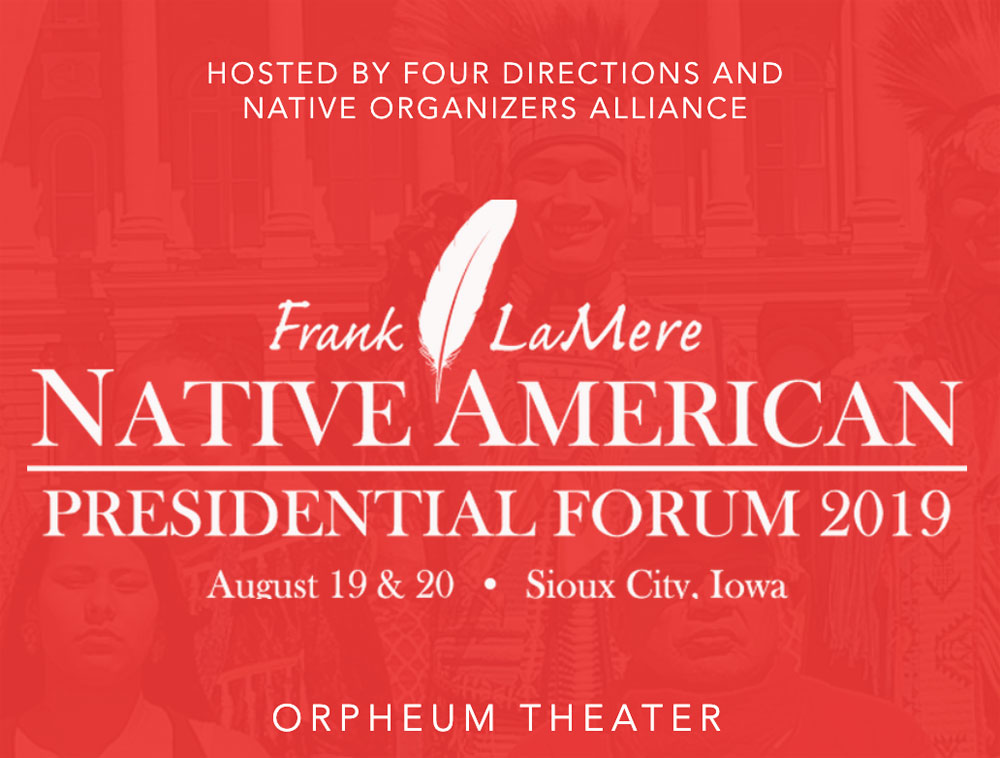
August 19, 2019; Indianz.com, Des Moines Register, and New Republic
Three months ago at NPQ, we wrote about plans underway to host a forum in Sioux City, Iowa, “to engage in a town hall centered around Indian Country issues.” Yesterday, the Frank LaMere Native American Presidential Forum began.
The gathering marks the largest number of US presidential candidates ever to participate in an event focused on Indian Country. Writing with dramatic flair, Nick Martin proclaims in New Republic, “It took 243 years, but the path to the United States presidency, or at least the Democratic nomination, will run through Indian Country.”
Still, even if Martin might be guilty of hyperbole, there is no doubt that the presidential forum marks a milestone in modern-day Native American political organizing. As Martin writes, “The two-day event, named after the late member of the American Indian Movement and chairman of the Native American Caucus of the Democratic Party, will feature two panels of tribal leaders, sovereign tribal nation citizens, and Native youth from across the country asking questions of the presidential hopefuls.”
As NPQ has pointed out, Native American organizing in 2020 builds on the successes of 2018, which saw Representative Sharice Davids (Ho Chunk, D-KS) and Representative Deb Haaland (Pueblo of Laguna, D-NM) win congressional seats and become the first two American Indian women ever to be elected to Congress.
Sign up for our free newsletters
Subscribe to NPQ's newsletters to have our top stories delivered directly to your inbox.
By signing up, you agree to our privacy policy and terms of use, and to receive messages from NPQ and our partners.
In 2018, we noted that along with “gains at the federal level came state and local electoral victories, including the election of Peggy Flanagan (White Earth Ojibwe) as lieutenant governor in Minnesota, and the election of Willie Grayeyes and Kenneth Mayboy, both Navajo, to county office in San Juan County, Utah. In North Dakota, American Indian nations mobilized, leading to record turnout, thereby defeating state voter suppression efforts and making Ruth Buffalo (Mandan, Hidatsa, and Arikara) the first Native American Democratic woman ever elected to the state legislature.”
This week’s forum, organized by Four Directions, a Native American advocacy organization, has attracted a total of 11 presidential candidates—10 are seeking the Democratic Party nomination and one is running as an independent. Participating yesterday were author Marianne Williamson, Senator Elizabeth Warren (MA), Senator Amy Klobuchar (MN), and Governor Steve Bullock (MT).
Scheduled to participate today are Representative Joe Sestak (PA), Representative John Delaney (MD), former US Housing and Urban Development (HUD) Secretary Julián Castro, Senator Bernie Sanders (VT), and Mayor Bill de Blasio (New York City). Senator Kamala Harris of California plans to participate via Skype. Mark Charles, a Navajo who is running as an independent, will also participate. Each candidate faces questions for about an hour.
As Ledyard King and Shelby Fleig write in the Des Moines Register, part of the reason so many candidates have agreed to appear is because “the Native American vote could be a factor that tips the outcome in six key states next year: Arizona, Michigan, Minnesota, Nevada, North Carolina, and Wisconsin.” In each of those states, the number of eligible Native American voters exceeds the margin of the winning presidential candidate in 2016. (Michigan, Arizona, North Carolina and Wisconsin went Republican in the 2016 presidential election; Nevada and Minnesota went Democratic.) Indian Country Today editor Mark Trahant, who is moderating the forum, noted also that Native American voters could have a sizable influence in such early primary and caucus states as Arizona, Nevada, and Iowa.
King and Fleig record the prominent positions that some presidential candidates have taken on issues related to the needs of Native American communities:
- Castro recently unveiled a five-point plan to increase funding for the Indian Health Service and upgrade infrastructure on tribal lands, among other goals.
- Williamson, while attending the Meskwaki Powwow, said if elected she’d immediately remove the “insulting” portrait of Andrew Jackson from the Oval Office.
- Warren recently released a 19-page plan that calls for economic development and improvements in access to health care.
- Sanders, like Castro and Williamson, dedicates a section of his official website to Native American issues like tribal sovereignty and historical racism.
O.J. Semans, a Rosebud Sioux citizen and co-executive director of Four Directions, says that the attention the event is receiving is nice, but the organizing has a more profound goal than getting attention. As Semans tells Martin, “the forum isn’t ultimately about the candidates, the panelists, or even the tribal leaders who will attend. The event is about the five million Natives across the country who will finally see the American government not as an external agent of colonization, but as their own elected representative, one that they can shape and mold themselves.”—Steve Dubb













